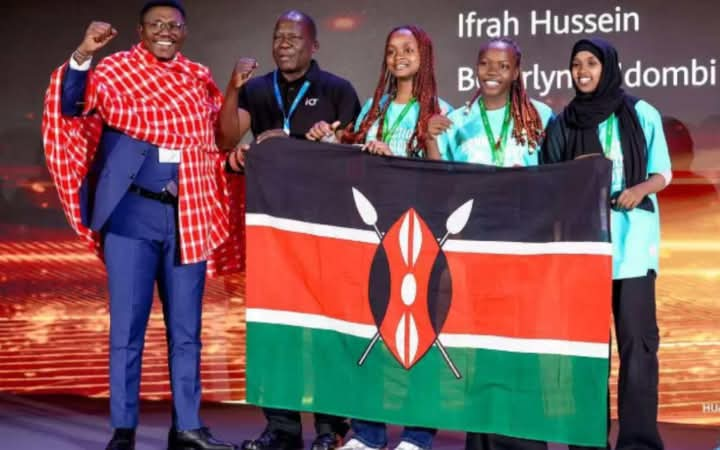Nairobi, May 25 : Kenya’s tech-savvy students just put the world on notice, as the country continues to spearhead digital transformation in Africa and make a footprint in the globe.
In what can only be described as a historic clean sweep, Kenyan university teams stunned the globe at the Huawei ICT Competition 2024/2025 finals in Shenzhen, China—clinching top spots in multiple categories, including Computing, Innovation, and Cloud. It’s the kind of moment that screams: Africa’s digital future is already here.
Team Kenya didn’t just show up—they conquered. The Computing Track saw Esther Guichaiya and Ephraim Shikanga from JKUAT, joined by Machakos University’s Mark Omaiko and Ian Omwenga, claim the first prize, outperforming student teams from over 48 countries.
If there was ever a time to believe in student-led innovation, this was it. The Innovation Track lit up with yet another Kenyan victory, thanks to a creative powerhouse trio—Karimi Muriithi, Denis Syengo, and Peterson Kariuki of Egerton University—under the guidance of Patricia Gitonga from the University of Nairobi.
Their project? A Smart Air Quality Monitoring System designed to tackle real-world environmental challenges using AI and IoT—a pitch delivered live and in person, proving that Kenyan innovation isn’t just theoretical; it’s actionable and scalable.
The team didn’t just bag awards—they made it clear that Kenya is emerging as a true hub of intelligent solutions in Africa’s tech space.
The Cloud Track saw Kenya’s all-female team earn a standing ovation—and a silver medal. Ifrah Hussein and Beverly Ndombi of Moi University teamed up with Banzy from JKUAT, taking home second place and an extra accolade: the Women in Technology Award. It’s a special recognition that not only honors skill but also underlines the growing impact of female talent in STEM.
Meanwhile, in the Network Track, a united front from three universities—JKUAT’s Rukia Mwari Mohammed, Machakos University’s Brian Kipkoech, and University of Nairobi’s Odanga Clemet—secured second place with their combined tech finesse.
And as if that wasn’t enough, Egerton’s “Silicon Savannah” team added a third-place finish in the Innovation category, reinforcing the country’s growing rep as a tech-savvy nation to watch.
Kenya’s high-profile presence in Shenzhen was led by Youth and Creative Economy PS Fikirini Jacobs and Kenyan Ambassador to China Willy Bett, signaling serious government backing for youth talent and international ICT collaboration.
The competition—hosted under the theme “Connection, Glory and Future”—attracted over 210,000 participants from more than 2,000 universities globally.
Huawei officials noted that this year’s contest featured upgraded tracks aligned with the evolving demands of an intelligent world. The convergence of academia, industry, and government wasn’t just symbolic—it was strategic. As one Huawei representative put it, these talented youth will be the ones to “bridge the digital divide and integrate green principles into their designs.”
Backed by UNESCO’s Global Skills Academy as a flagship youth upskilling program, the Huawei ICT Competition has become a vital platform for bridging the digital skills gap worldwide. In China, it’s even listed as a national-level contest.
From code to cloud to climate solutions, Kenyan students have shown the world that brilliance doesn’t require a Silicon Valley zip code. It takes vision, opportunity, and a country ready to bet on its youth.
Kenya has established itself as one of Africa’s leading digital hubs, with a vibrant online ecosystem that continues to expand.
Mobile connectivity has become nearly universal, with internet accessibility improving across both urban and rural areas. This digital infrastructure provides the foundation for various online income opportunities, enabling youth to overcome traditional employment barriers and tap into global markets from anywhere in the country.
Youth unemployment remains a persistent challenge, with statistics suggesting that a significant proportion of the 2.97 million unemployed Kenyans are aged between 18 and 29. This demographic, equipped with tech-savvy minds and an appetite for change, is turning to the digital sphere to build alternative income streams.
For many young Kenyans, the challenge isn’t just finding a job but finding one that offers decent pay, flexibility, and growth potential. Online platforms address these needs by providing accessible entry points into the digital economy, allowing youth to leverage their existing skills or develop new ones that meet market demands and end up making money online that can sustain them.
Africa at large, is a continent with a rapidly growing population and a large number of young people. This presents a huge opportunity for the continent, but also a significant challenge in terms of job creation and economic development.
Youth entrepreneurship has emerged as a potential solution to this challenge. African youth are increasingly recognizing that traditional employment opportunities are limited and turning to entrepreneurship as a means of creating their own economic opportunities.
Empowering the young entrepreneurs of Africa, By providing access to resources, mentorship, and markets, is vital for driving economic growth, reducing poverty, and shaping the future of the continent.







